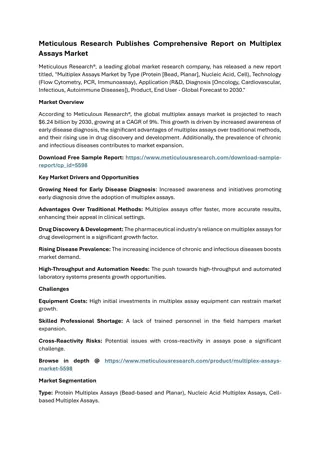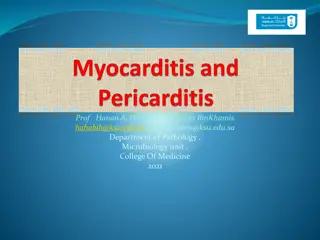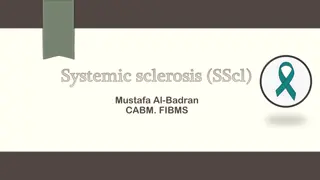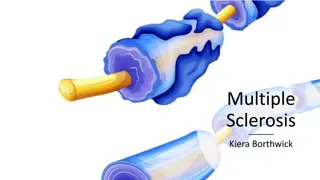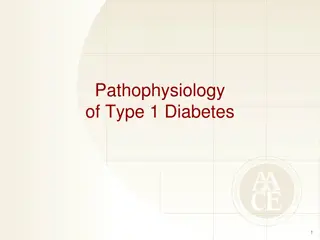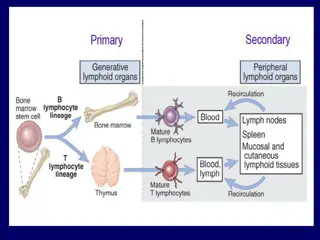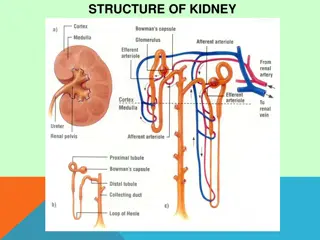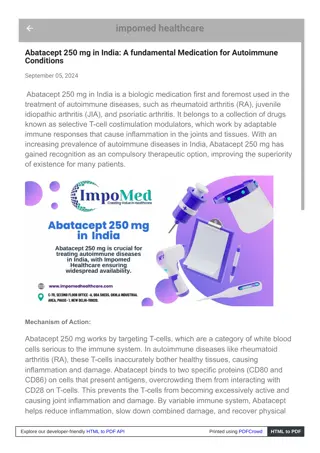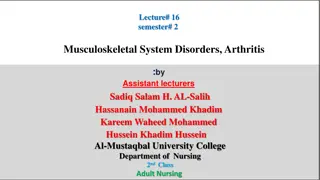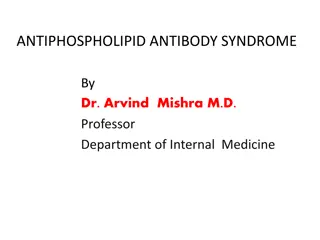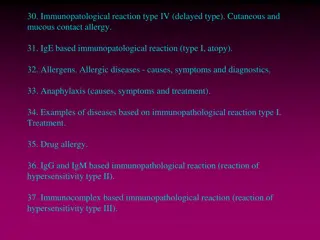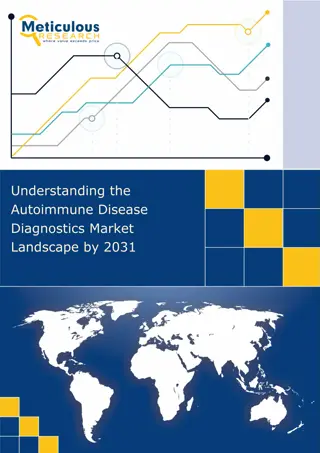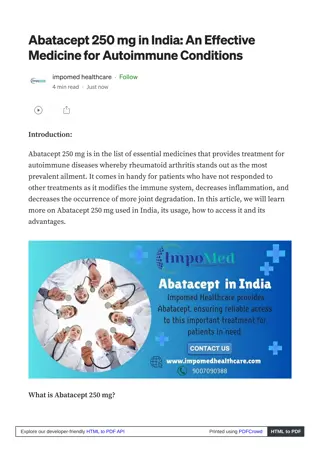Understanding Acute Rheumatic Fever: Causes, Symptoms, and Impact
Acute Rheumatic Fever (ARF) is a multisystem disease resulting from an autoimmune response to a sore throat caused by Group A beta-hemolytic Streptococci. It primarily affects children aged 5-14 years and can lead to rheumatic heart disease (RHD), which is the most common cause of heart disease in c
2 views • 48 slides
Understanding Immune Thrombocytopenia (ITP) and Its Impact
Immune Thrombocytopenia (ITP) is a rare autoimmune disease where the immune system wrongly attacks platelets, leading to low platelet count. It can affect individuals of all ages, with symptoms appearing post-virus, vaccination, or certain medications. ITP can result in fatigue, bruising, and bleedi
3 views • 30 slides
The lacrimal system
Disorders of the lacrimal system can lead to chronic symptoms affecting the eyes, causing discomfort and vision problems. Common abnormalities include dry eye, which can result from tear flow and evaporation issues. Aqueous-deficient dry eye, often associated with Sjögren's syndrome, is characteriz
3 views • 38 slides
Know All About Primary Ovarian Insufficiency (POI)
Understanding the causes, identifying the symptoms, and analyzing available therapies are important for managing this difficult reproductive health issue effectively. Reasons for Premature Ovarian Failure include various elements, including genetic abnormalities, autoimmune disorders, chemotherapy,
0 views • 7 slides
Meticulous Research Publishes Comprehensive Report on Multiplex Assays Market
Multiplex Assays Market by Type (Protein [Bead, Planar], Nucleic Acid, Cell) Technology (Flow Cytometry, PCR, Immunoassay) Application (R&D, Diagnosis (Oncology, Cardiovascular, Infectious, Autoimmune Diseases) Product, End User - Global Forecast to 2030\n
0 views • 2 slides
Adhd Medication And Autoimmune Disease – trinexpharmacy.com
Adhd Medication And Autoimmune Disease is a common neurodevelopmental disorder that affects both children and adults. On the other hand, autoimmune diseases encompass a range of conditions where the immune system mistakenly attacks the body's own tissues. \nContact : 1 (747) 209 \u2013 3649\n\nE-ma
2 views • 7 slides
Plasmapheresis Market to Hit $2.55 Billion by 2030 Amid Rising Autoimmune Disea
The Plasmapheresis Market is anticipated to reach $2.55 billion by 2030, growing at a compound annual growth rate (CAGR) of 8.6% from 2023 to 2030.\n
0 views • 4 slides
Antibodies in Vaccines: Risks and Case Studies
Explore the impact of antibodies in vaccines and their link to autoimmune diseases through case studies. Uncover the safety signals related to various antibodies and their potential risks in COVID vaccine recipients. Discover how antibodies like Beta-2 Glycoprotein, Antiplatelet, and DNA can lead to
0 views • 9 slides
Understanding Graft-Versus-Host Disease (GVHD) and Its Symptoms
Graft-versus-host disease (GVHD) is a potential complication following stem cell or bone marrow transplants, where donor cells attack the recipient's body. GVHD can occur in acute or chronic forms, presenting symptoms such as abdominal issues, skin rash, dryness, joint pain, and more. This autoimmun
0 views • 13 slides
Understanding the Immune System: Organs, Functions, and Importance
The immune system acts as a defense mechanism against pathogens and infections, comprising various organs, such as the bone marrow, thymus, spleen, white blood cells, antibodies, complement system, and the lymphatic system. It works to recognize and destroy harmful microbes, maintaining the body's h
1 views • 23 slides
Plasma Exchange in Treatment of PANS - Overview and Considerations
Plasmapheresis, a type of apheresis, plays a crucial role in managing Pediatric Acute-onset Neuropsychiatric Syndrome (PANS) and Pediatric Autoimmune Neuropsychiatric Disorders Associated with Streptococcal Infections (PANDAS). This treatment involves separating the extracellular component of blood
0 views • 26 slides
Understanding Myocarditis: Epidemiology, Pathogenesis, and Management
Myocarditis is an inflammatory heart condition with various causes, including viral infections and autoimmune responses. This article discusses the epidemiology, risk factors, pathogenesis, diagnosis, and management of myocarditis, highlighting the importance of differentiating it from pericarditis
1 views • 35 slides
Understanding Systemic Sclerosis: Causes, Symptoms, and Management
Systemic sclerosis (SScl) is an autoimmune disorder affecting connective tissue, leading to fibrosis in the skin, internal organs, and vasculature. It is characterized by Raynaud's phenomenon, digital ischemia, sclerodactyly, and cardiac, lung, gut, and renal involvement. Peak onset is in the fourth
1 views • 28 slides
Understanding Multiple Sclerosis: Symptoms, Progression, and Treatment Options
Explore the cellular processes, symptoms, disease progression, and treatment options associated with Multiple Sclerosis (MS). Discover how MS, an autoimmune disease, affects the nervous system leading to a range of symptoms. Learn about the clinical progression of MS and how the immune system causes
0 views • 12 slides
Understanding Inflammation and Repair in Tissue Response
Inflammation is a crucial process in response to tissue injury, aiming to eliminate harmful agents and promote healing. It involves vascular changes, increased permeability, and the formation of edema. Repair follows inflammation, involving regeneration and fibroblastic tissue formation. While infla
0 views • 57 slides
Understanding Autoimmunity and Autoimmune Disorders
Autoimmunity refers to the immune system's failure to recognize its own cells, leading to attacks on self-tissues. Autoimmune disorders encompass over 80 chronic illnesses where the immune system mistakenly targets organs. These disorders are poorly understood and recognized, impacting various organ
1 views • 20 slides
Understanding Autoimmunity and Immunological Tolerance
Autoimmunity is a condition where the body's immune cells mistakenly attack its own tissues, leading to damage. Immunological tolerance helps prevent this by mechanisms like central and peripheral tolerance. Central tolerance involves deleting self-reactive immune cells during maturation in key orga
1 views • 32 slides
Diabetes Mellitus Type 1 Management Guidelines for Athletes
Diabetes Mellitus Type 1 is a chronic endocrine disorder characterized by hyperglycemia, absolute insulin deficiency, and autoimmune origins. This condition, more common among athletes, requires careful monitoring, insulin therapy, blood glucose management during exercise, and recognition of hypogly
0 views • 7 slides
Understanding Type 1 Diabetes Pathophysiology and Etiology
Type 1 diabetes is characterized by absolute insulin deficiency, resulting from pancreatic beta cell destruction. It is prone to ketosis with a total deficit of circulating insulin, often due to autoimmune factors. The pathophysiology involves inflammation, immune-mediated cell destruction, and a ch
0 views • 13 slides
Opportunities for Undergraduates in Health Research Lab
The Mohan Research Lab offers undergraduates the chance to conduct impactful research that can be published, focusing on biomarkers and targets for autoimmune diseases and cancers. Led by an international team of researchers, the lab provides a collaborative environment for students to engage in cut
4 views • 12 slides
Immune Response Regulation and Autoimmunity Overview
The immune system maintains a balance through tolerance mechanisms to prevent autoimmunity. Central and peripheral tolerance play crucial roles in immune unresponsiveness to self-antigens. Failure in immune regulation can lead to autoimmune diseases like diabetes and lupus. Vaccination, discovered b
0 views • 18 slides
Understanding Nephritis: Causes, Symptoms, and Subtypes
Nephritis is a serious medical condition characterized by inflammation of the nephrons in the kidneys. This inflammation can lead to various subtypes such as glomerulonephritis and interstitial nephritis, each with its own causes and symptoms. Common symptoms of nephritis include edema, changes in u
0 views • 26 slides
Integration of Ayurveda in Modern Medicine Clinical Practice
The integration of Ayurveda in modern medicine clinical practice is a growing field focusing on research in pathophysiology, physiology, biochemistry, and cell biology. Ayurveda is being applied to address conditions such as atherosclerosis, stroke, dementia, Parkinson's disease, autoimmune rheumato
0 views • 17 slides
Understanding Achalasia: Therapeutic Approaches, Pathophysiology, and Clinical Manifestations
Achalasia is characterized by a failure of the lower esophageal sphincter to relax, leading to difficulty in swallowing and regurgitation. The exact cause is unknown, but autoimmune factors and chronic infections may play a role. Symptoms include dysphagia, chest pain, regurgitation, and weight loss
0 views • 59 slides
Abatacept 250 mg in India: Effective Treatment for Autoimmune Diseases
This PDF explores how Abatacept 250 mg provides targeted relief for autoimmune conditions like rheumatoid arthritis, juvenile idiopathic arthritis, and psoriatic arthritis. Learn more about Abatacept 250 mg in India.
1 views • 4 slides
Understanding Hemolytic Anemia: Classification and Management
Hemolytic anemia encompasses various subtypes like autoimmune hemolytic anemia, with warm and cold antibodies, each requiring unique management strategies. Diagnosis involves specific investigations like the Coombs test. Treatment typically involves corticosteroids as first-line therapy, while secon
1 views • 23 slides
Agglutination Testing in Laboratory Medicine
Agglutination testing is a common method used in laboratory medicine to detect the presence and amount of antigens or antibodies in patient samples. It involves the use of carrier particles such as latex, RBCs, charcoal, and protein A of Staph aureus. The testing process includes qualitative and qua
0 views • 18 slides
Oral Manifestations of Systemic Diseases in Dentistry
This content explores various systemic diseases and their oral manifestations relevant to dentistry. It covers associations between heart disease and periodontal disease, effects of chronic corticosteroid use on the pulmonary system, endocrine disorders like diabetes and thyroid issues, autoimmune d
1 views • 63 slides
Understanding Vitiligo: Causes, Symptoms, and Treatments
Vitiligo is a skin condition characterized by white patches due to loss of pigment cells. The causes include autoimmune disorders, genetic factors, neurogenic factors, and self-destruction of melanocytes. Symptoms include hair whitening, color loss in tissues, and changes in eye color. Treatments ma
0 views • 21 slides
Bimonthly Volunteer Webinar Agenda and Updates - May 2018
The bimonthly volunteer webinar held in May 2018 featured various updates including ambassador updates, advocacy updates, fundraising updates, and a Q&A session with Jenni Grover on thriving with pain. Participants were encouraged to engage on World Autoimmune Arthritis Day and promote Pain Awarenes
0 views • 25 slides
Health Benefits of Amaranth: A Nutritious Ancient Grain
Amaranth is a small ancient grain rich in antioxidants, high-quality protein, and dietary fiber. Consuming amaranth may help reduce the risk of heart disease, diabetes, cancer, and autoimmune diseases. It is gluten-free and a good source of essential amino acids, manganese, and vitamin C, making it
0 views • 9 slides
Understanding the Importance of the Immune System for Homeostasis
Explore the intricate workings of the immune system, from its component parts and defense mechanisms to the significance of homeostasis maintenance. Discover how non-specific and specific immune responses, phagocytosis, neutrophils, natural killer cells, and interferons play vital roles in protectin
0 views • 32 slides
Understanding Arthritis: Types, Causes, and Symptoms
Arthritis is inflammation of joints causing pain and limited function. It can be due to injury, metabolic abnormalities, hereditary factors, infections, or autoimmune conditions. Types include Osteoarthritis, Rheumatoid Arthritis, Gout, Ankylosing Spondylitis, Psoriatic Arthritis, and Reactive Arthr
0 views • 14 slides
Understanding the Interplay of the Immune System and Endocrine Disorders
Explore the intricate mechanisms of immunological damage to endocrine glands, focusing on disorders like Graves disease, Hashimoto's thyroiditis, type I diabetes, and Addison's disease. Delve into the association of autoantibodies with pathogenic and diagnostic significance, uncovering the complexit
0 views • 33 slides
Effect of Efgartigimod on Humoral Vaccine Responses in Patients with Autoimmune Diseases
The study explores the impact of Efgartigimod, a Neonatal Fc Receptor blocker, on humoral vaccine responses in patients with autoimmune diseases. It discusses how immunosuppressive therapies used in autoimmune disorders may affect susceptibility to infections and impair vaccine immunogenicity, highl
0 views • 18 slides
Understanding Antiphospholipid Antibody Syndrome and Its Clinical Implications
Antiphospholipid antibody syndrome is an acquired disorder characterized by recurrent thrombosis or pregnancy complications due to autoantibodies against phospholipid-binding plasma proteins. Learn about its classification, epidemiology, pathogenesis, and diagnostic antibodies. Discover how lupus an
0 views • 35 slides
Understanding Coeliac Disease and Modified Diets for a Healthier Lifestyle
Coeliac disease is an autoimmune condition that affects the body's ability to process gluten, leading to various symptoms like abdominal pain, fatigue, and nutrient deficiencies. Following a modified diet, such as a vegetarian or gluten-free diet, can help manage these symptoms and promote better he
0 views • 17 slides
Understanding Immunopathological Reactions and Autoimmune Diseases
Discover the classification of immunopathological reactions by Gell and Coombs, including Type I to IV reactions, with insights into allergic diseases, anaphylaxis, drug allergy, and autoimmune diseases like Graves' disease and Myasthenia gravis.
0 views • 51 slides
Autoimmune Disease Diagnostics Market
The autoimmune disease diagnostics market is set for robust growth, anticipated to reach $10.55 billion by 2031, thanks to increased investment in research and development for accurate diagnostic solutions.\n
1 views • 5 slides
Abatacept 250 mg in India: A Reliable Treatment for Autoimmune Diseases
Abatacept 250 mg in India is used to treat autoimmune diseases such as rheumatoid arthritis, juvenile idiopathic arthritis, and psoriatic arthritis. It reduces inflammation and joint pain, slowing disease progression. Abatacept 250 mg in India avail
0 views • 11 slides




